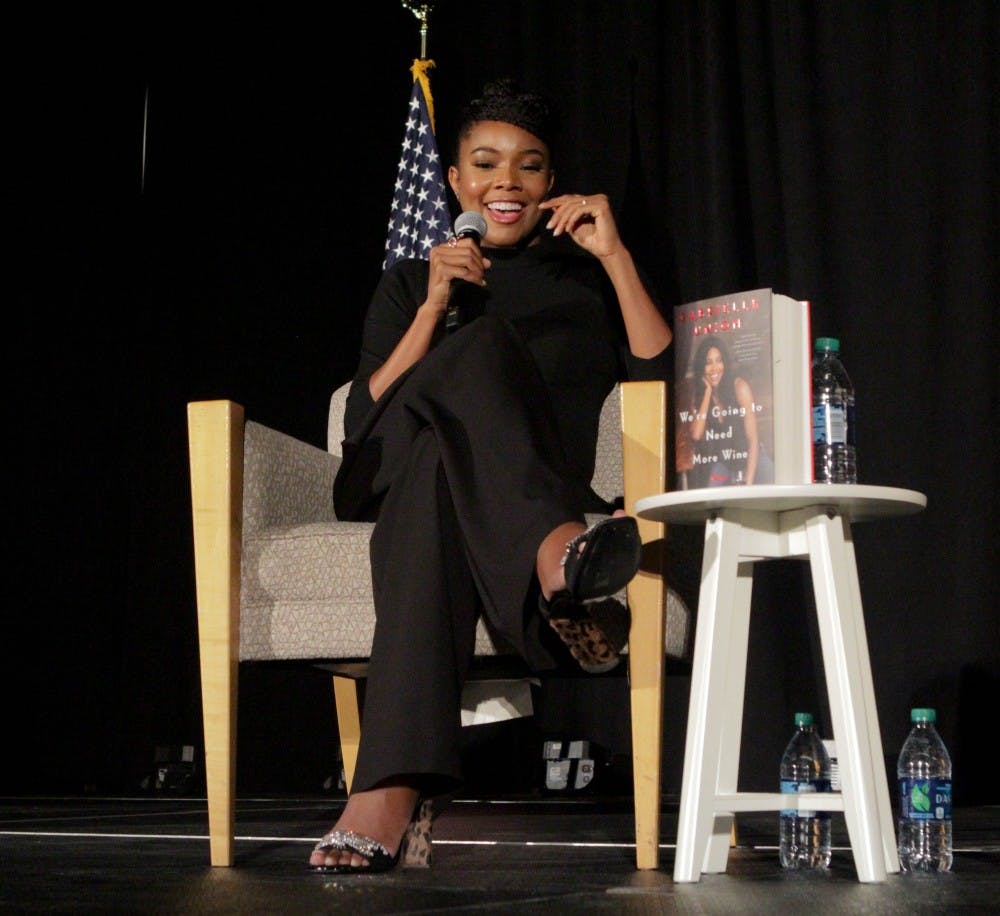The Kennedy Political Union hosted actress and activist Gabrielle Union Saturday to discuss her recent book, “We’re Going to Need More Wine,” and her life as an African-American actress in Hollywood during All-American Weekend.
During her speech, Union talked about the importance of mental health, the discrimination she experienced as a black actress in Hollywood and her childhood that was spent between two places. The Eagle and other student media organizations also interviewed Union in a closed-door round table.
In the interview, Union addressed the shooting of Trayvon Martin, an unarmed black teenager shot by a neighborhood guard in Sanford, Florida in 2012. Union and her husband, Cleveland Cavaliers guard Dwyane Wade, lived in Miami at the time.
“Anytime there’s state-sanctioned violence is alarming,” Union said. “When you’re raising teenage boys in the state of Florida, that is a open carry state, a ‘stand your ground’ state, and you watch the news and you know that if our children are not literally standing by us with a sign that says, ‘I am the children of Dwayne Wade and Gabrielle Union.’ They’re just black boys, and when you’ve seen blackness be weaponized and demonized and deemed inherently threatening from birth, it is terrifying.”
Union denounced police violence against black Americans and spoke about Tamir Rice, a 12-year-old who was shot and killed by Cleveland police in 2014.
“In less than two seconds they deemed his blackness threatening and in need of putting down, like an animal,” Union said. “We live in a state and a country that you can kill us and get away with it and all you have to say was ‘I was afraid,’ whether we were armed or not, whether we were coming at you or not.”
Following the round table interview, Union gave a speech to students, parents and others gathered in Bender Arena. She talked about her childhood in Omaha, Nebraska, a predominantly African-American area, compared to her experiences when her family moved to Pleasanton, California, a majority white town. Union emphasized that she felt uncomfortable while living in Pleasanton.
“Our blackness was something we had to suppress or give over,” Union said. “We found our proud black family, in a space, in a town that was not used to blackness.”
Among other topics, Union touched on the racist incidents that AU has faced in the past year, one of which was termed a hate crime by the FBI,
“When I found out I was coming here, I remember some of the challenges, as a nice way of saying it, that this university has faced in dealing with race,” Union said. “And I challenge us all here to be accountable for our s--t.”
After Union’s speech, she participated in a Q-and-A session led by Sybil Williams, a lecturer in the Department of Performing Arts Union, a sexual assault survivor, stressed the importance of mental health care.
“At UCLA, what I loved as a student you got free mental health. It literally saved my life, and I am imploring the young people and the older people, get help,” Union said. “It says nothing about your character, it says nothing about your strength. It takes a very strong person to walk through the doors of a therapist and to try to heal yourself.”
Toward the end of the event, Union was asked about things the audience could do to better assist survivors in “remaining whole.”
“As fellow decent human beings, you have to understand that no one wants to be raped, no one wants to experience sexual violence, no one wants to be sexually harassed and also understand that anyone, anywhere, at any time, can be raped,” Union said.
Union stressed that assault is never the fault of the survivor.
“The reality is, I was raped by a stranger, at work, at gunpoint … a family friend still asked what I had worn,” Union said. “Don’t put the onus on the victim, put the onus on the perpetrator of sexual violence.”





